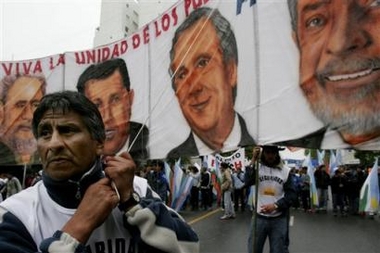Cumbre de las Américas - Mar del Plata, Argentina 4 y 5 de Noviembre de 2005
Anti-Bush Protesters Take to the Streets
By DAN MOLINSKI, Associated Press Writer

MAR DEL PLATA, Argentina - A crowd of 10,000 people chanting "Get out Bush!" swarmed the streets of this Argentine resort Friday, hours before the hemisphere's leaders sat down to debate free trade, immigration and job creation at the fourth Summit of the Americas.
Before dawn, thousands greeted a train bringing the last group of protesters from Buenos Aires, including Bolivian presidential hopeful Evo Morales and soccer great Diego Maradona, who donned a T-shirt accusing President Bush of war crimes.
Chanting "Fascist Bush! You are the terrorist!" the protesters hung from the engine and moved up the sides of the train, trying to shake hands with those inside.
Later, they took to the streets, heading toward a stadium where Venezuelan President Hugo Chavez was scheduled to make a speech before joining the summit. Chavez arrived early Friday, saying he was "inspired" by the protesters.
The march was mostly peaceful, although some self-proclaimed anarchists spray-painted slogans on a bank. Most businesses along the route had closed, except for a fruit stand protected by a wall of wooden crates.
"So far, I've only lost four bananas," owner Blas Zanghi said.
Bush was meeting with Argentine President Nestor Kirchner as well as Central American leaders Friday before joining the 34-nation summit and promoting the Free Trade Area of the Americas. The deal proposed by Washington would break down trade barriers from Alaska to the tip of South America.
Leaders attending the two-day summit agreed ahead of time to focus on creating jobs and reducing poverty. In recent days, however, attention has shifted to the free trade issue and sparring between the United States and Chavez, a leftist whose government has used his country's vast oil wealth on social programs for the poor.
Washington maintains the proposed free trade accord, which has stalled amid opposition by several Latin American countries, is vital to creating jobs and increasing wealth in the region.
"What we're looking to do is find ways to unlock some of these economies so they get the kind of investment they need, they get the kind of trade they need and they have the flexibility within their labor markets to generate employment," Thomas Shannon, U.S. assistant secretary of state for the Western Hemisphere, said Thursday.
Chavez, who regularly claims Washington is trying to overthrow him, has said free trade is being forced on Latin American countries and the deal would only help the rich. Instead, he has pushed for an anti-FTAA deal based on socialist ideals.
He has pushed for regional solidarity, offering fuel with preferential financing to various Caribbean and Latin American countries. Venezuela is a member of the Organization of Petroleum Exporting Countries and the world's fifth-largest oil exporter.
Bush arrived Thursday, the same day Venezuela staged a mock U.S. invasion of its own territory. The event was the latest exercise intended to prepare soldiers and civilian volunteers for what Chavez says is a possible attack by American troops.
U.S. officials deny any such plan.
Chavez and Bush will likely see each other Friday at the summit's inauguration, but the two leaders are not scheduled to meet one-on-one.
Jose Miguel Insulza, secretary-general of the Organization of American States - the Washington-based group that organized the summit - said he was disappointed by the attention given to the free trade deal.
"This is not a summit about the FTAA," a frustrated Insulza told reporters.
But Bush seemed to be winning over supporters. A high-ranking Brazilian official, who said he was not authorized to give his name, told reporters 28 of the 34 countries participating in the summit had agreed to relaunch trade talks as early as April.
Costa Rican President Abel Pacheco and his Mexican counterpart Vicente Fox said Thursday they would focus bilaterally on the search for regional solutions to high oil prices. Fox also complained of resistance to accept what he called "the freedom" of workers to migrate across borders, and said Mexico would raise the immigration issue at the summit.
___
Associated Press writers Nestor Ikeda, Vivian Sequera, and Alan Clendenning in Mar del Plata and Kris Kitto in Buenos Aires contributed to this report.
IV Cumbre de las Américas | argentina | alca/ftaa | www.agp.org | www.all4all.org